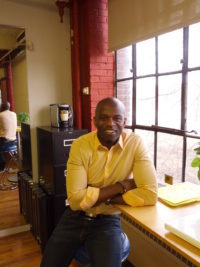Meet Daniel Opoku
“CNETS Canada has made a difference to me as a patient by hosting a conference that was life changing. I got great information I could use directly to get on the right treatment plan and connected with people that I have a relationship with to this day.”

Daniel Opoku – Montreal, QC
Daniel Opoku is an active individual who happens to have neuroendocrine cancer. He works in the aerospace industry; previously as an engineer and now in marketing. Among his hobbies are flying and cycling. He loves being part of a team both at work and in his volunteer activities.
What has been your involvement with CNETS Canada?
“As a patient, I have benefited tremendously – the national conference in Ottawa in 2012 was a big part of steering my life as a NET patient in the right direction. Now I am part of a group of volunteers and a support group leader. I am also a member of a national group working on CNETS Canada conference activities. Now I want to help others.”
What if CNETS Canada did not exist?
“It would be a lot tougher for patients – quite a void. They would have to seek out organizations in other places such as the USA and Europe. Local support and organizations make a difference. Everyone would be trying to fill the void by searching for the same information. Patients need to save this energy for other things. With an organization like CNETS Canada, everyone collectively benefits.”
What if CNETS Canada did not exist?
“There would be no one advocating for proper care and treatment for our NET cancer patients in Canada.”
What parts of our work have you benefitted from the most??
“The first is the conference I attended in 2012. Secondly, I met people there that I have had a relationship with since then. The third thing is that I got credible information to help clarify the mystery of neuroendocrine cancer.”
What do you want from CNETS Canada as a patient?
“At first, patients need basic information to get started. This includes what neuroendocrine cancer is, its symptoms and the benefits and risks of different treatments. After that, you need additional information. Connectivity is also really important because it is easy to feel isolated. The reality is that you might be lucky to connect with someone with neuroendocrine cancer in the same city even though this cancer is becoming more prevalent.”
